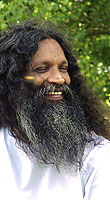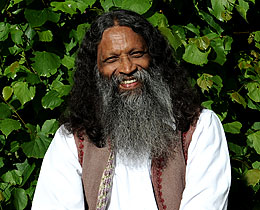School of Santhi
Yoga School in India,
Traditional Yoga Teacher Training in Kerala, South India
|
The treatise
of Yoga comes to you only in the precious present, where in the reality
unravels! We have been learning many things and finally here we are
now to unlearn; to say goodbye to the mind!
Yoga Sutra 5.
VRITAYA
PANCATAYYA KLISTAKKLISTA

The modifications of chitta are five fold, which may be klista
or aklista, harmful or beneficial, cognizable or non-cognizable.
The modifications are:
Yoga Sutra 6.
PRAMANA,
VIPARYAYA, VIKALPA, NIDRA and SMRITAYAHA
Comprehension or correct knowledge, misapprehension or incorrect knowledge,
imagination, sleep and memory.

Pramanam is correct comprehension based on direct perception; inference and
reference to authorities and documents.
Viparyaya is misapprehension or mal-comprehension
or incorrect cognition.
Vikalpam is
imagination in the absence of an object or natural phenomena.
Nidra is
the temporary suspension of awareness and of mental modifications resulting in
darkness and ignorance and is called dreamless sleep.
Smrity is
memory.
What is Pramana?
Yoga Sutra 7.
PRATYAKSA
ANUMANAGAMA PRAMANANI

The word Pramana derives from the root Prama, which means uncontradicted
knowledge about an object presented to the mind.
The way of getting
correct knowledge is Pramana. This is one of the major activities
of the mind. Direct perception, inference and reference to testimony
are the usual process involved in pramana.
Mind is the repertory
of information collected through the sense organs from the external
world. It also processes the information that is coming in; it
compares with previous data, discriminate and determines the
good and bad or right and wrong of it and synthesizes knowledge.
The synthesized knowledge is further modified into concepts and
presented before the individuated self who owns all actions and
its fruits. The individuated self identifies with the results,
either enjoys or suffer. It is a continuous process that happens
in the consciousness which is motivated by the pressure of knowing
the nature around.
This pressure of knowing comes out of the
longing for happiness, which is inherent in knowledge. This is
a major modification of the mind continuously active, except
when a person is either in dream less sleep or in a state of
integration.
The next
fluctuation of consciousness is Viparyaya, which means wrong
cognition, misapprehension, or misunderstanding or false knowledge.
|
Yoga
Sutra 8.
VIPARYAYO
MIDYAGNANAMATADRUPAPRATISTAM

Knowing a thing
as different from what is presented is Viparyaya.
Everyone look
at things from different point of views. Point of views is formed from the placement
of a person in collaboration with the particular time and the information at
the backdrop of his mind. It varies from person to person and time to time.
This strange phenomenon keeps objective knowledge in fragments having all possibilities
for interpretations. If a previous understanding gets further modified by subsequent
information, the earlier comprehension is considered as mal comprehension or
misapprehension.
This wrong knowledge or Viparya causes afflictions of uncertainty,
nescience, asmita or egoism, attachment and fear of loosing, the fear of death.
That modification of the mind which creates ideations based on words having
no substantiating natural phenomena or objects at its base is called imagination
or Vikalpam.
|
Yoga
Sutra 9.
SABDAGNANANUPATI VASTUSOONYO VIKALPA

Comprehension based
on a verbal cognition devoid of a thing or natural phenomena is called
Vikalpa. For example the ideation that we often attach with words
such as
Void
Silence
Brahmahan
Freedom
etc and the corresponding feeling and understanding that we could
get when we hear those words together constitute Vikalpa.
None of the above words are supported by a natural phenomenon and
hence these are beyond the comprehension of the mind.
These words connote ideas which have nothing
to do with the words and are mere words trying to portray states
beyond manifestation and human comprehension.
But
the mind continuously tries to coin words
and attributes meanings to such states of statelessness, and make
itself believe that by doing so it could comprehend what it is.
This modification of
the mind played in knowing
the unexplainable by connoting baseless ideations without the support
of natural phenomenon or thing is called Vikalpa or imagination.
Verbal delusion or vague
cognition is the cause of Vikalpa. Vikalpa
may be of vague notion of things, vague notion of action and vague
notion of nothingness.
Mind gets tired of its above activities or modifications and goes
into inertia or rest resulting in darkness which is called sleep.
|















